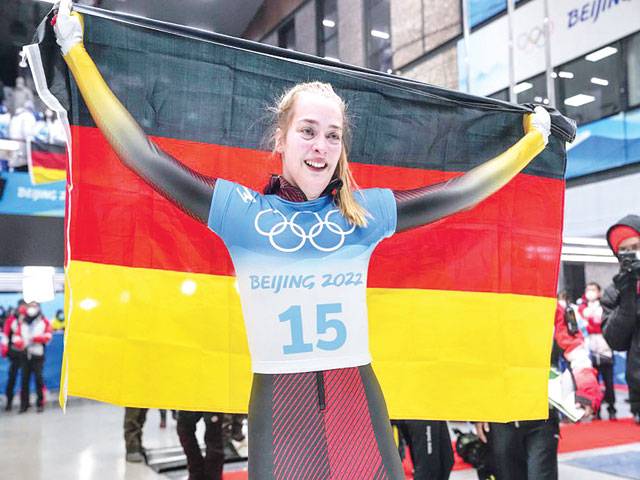ZHANGJIAKOU - Hannah Neise has never won a World Cup medal. Or a medal at the world championships. Or a medal from the European championships. She’s got an Olympic medal now. And it’s the one that everybody wants.
Skeleton has a new champion, and she was a bit of a surprise winner. Neise, the 21-year-old who won the junior world title last year, became the first German woman to capture the gold medal in Olympic skeleton by rallying in the final two heats at the Beijing Games on Saturday. “It is mindblowing,” Neise said. “I can’t realize it right now. I think it’ll take some time to realize it. It’s an unbelievable feeling.”
Her four-run time was 4 minutes, 7.62 seconds. Jaclyn Narracott of Australia — the midpoint leader of the event — won the silver in 4:08.24 and World Cup overall champion Kimberley Bos of the Netherlands took the bronze in 4:08.46. Neise’s win might have been a bit of a stunner, but at this point, nothing Germany does on this track should be that surprising.
After six sliding events at the Beijing Games — four in luge, two in skeleton — the Germans have captured six gold medals. Oh, and in the four remaining bobsled races — two for men, two for women — Germany features the reigning Olympic champion drivers in Francesco Friedrich and Mariama Jamanka.
Tina Hermann of Germany was fourth and Mirela Rahneva of Canada, the first-run leader, was fifth. Neise’s win capped a year that was unpredictable in women’s skeleton from the outset. There were eight World Cup races leading up to the Olympics, with five different winners and 11 different medalists — Neise not being one of them.
But there was a big hint that she could contend at the Olympics. There was a preseason race at the Yanqing Sliding Center after three weeks of international training this fall, and Neise was second in that event. Clearly, she figured some things out about the new track faster than most everyone else did. “I knew I could do it if my runs were good,” Neise said.
Katie Uhlaender, racing in her fifth Olympics, was the top American and finished sixth in 4:09.23. Uhlaender strained a muscle in her side before competing Saturday and still moved up two spots from where she was after Friday’s first two runs of the competition.
LINDVIK ENDS NORWAYS OLYMPIC DROUGHT WITH LARGE HILL TITLE
Marius Lindvik ended Norway’s 58-year Olympic ski jumping individual title drought on the large hill on Saturday, denying Japan’s Ryoyu Kobayashi a golden double at the Beijing Games. Lindvik came from behind to edge out Kobayashi, who won the normal hill crown last week and was bidding to become the first Japanese man ever to win both titles at the same Games.
Kobayashi had the lead after the first jump but Lindvik made a storming comeback with a second attempt of 140 metres, screaming “come on” as he slid into the finish area. It was enough to leapfrog Kobayashi into first place on 296.1 points, and the reigning Four Hills champion could not better it with his second jump, settling for silver on 292.8 points.
Germany’s World Cup leader Karl Geiger put in an improved performance to finish third on 281.3 points. Geiger had been out of sorts all week at the Beijing Games, finishing a dismal 15th place on the normal hill. Defending large hill champion Kamil Stoch of Poland -- the last man to both competitions at one Olympics -- finished fourth.






